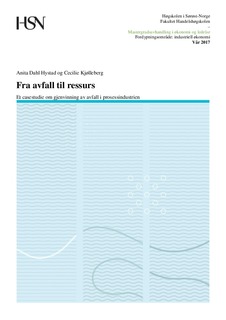| dc.description.abstract | Studien tar for seg avfallshåndtering i prosessindustrien i dag og muligheter i tiden fremover.
Vi ønsket å studere dette fenomenet fordi prosessindustrien totalt sett genererer store mengder restmateriale fra produksjonen som i dag blir plassert på deponi. Materialer som plasseres på deponi er ressurser på avveie og en potensiell miljøfare og burde derfor reduseres til et minimum. Hensikten med studien er å kunne bidra med mer kunnskap om konsekvenser ved å snu materialstrømmene fra deponering til gjenvinning i prosessindustrien. Basert på dette har vi valgt følgende problemstilling:
Hvilke økonomiske- og miljømessige konsekvenser vil gjenvinning av avfall fra produksjon ha for prosessindustrien?
For å besvare problemstillingen har vi benyttet et pågående gjenvinningsprosjekt, Waste 2 Value, som grunnlag for datainnsamlingen samt et teoretisk rammeverk. Prosjektet omhandler muligheter for gjenvinning av prosessavfall til et nytt produkt. Deltakende bedrifter i prosjektet er metallprodusentene: Alcoa, Norsk Hydro, Eramet og Glencore Nikkelverk, samt forskningsaktørene: Elkem Technology, ReSiTec, NTNU og SINTEF. Forskningsmetoden som er anvendt i studien er kvalitativ case studie. Prosjektet er benyttet som case og deltakende bedrifter som analyseenheter. Gjennom datainnsamlingen innhentet vi informasjon om dagens avfallshåndtering, tidligere gjennomførte prosjekter og bedriftenes miljøfokus. I tillegg fikk vi innblikk i potensielle behandlingsalternativer og tilhørende estimerte kostnader.
Med utgangspunkt i innsamlet datamateriale og det teoretiske rammeverket har vi gjennomført en analyse. I analysen samlet vi funn knyttet til blant annet metallprodusentenes avfallsstrømmer, fokus på avfallsreduksjon og erfaringer ved tidligere prosjekter. I tillegg samlet vi forskningsaktørenes potensielle behandlingsalternativer for avfallet og analyserte lønnsomheten. Studien har avdekket flere miljømessige- og økonomiske konsekvenser i forhold til gjenvinning av avfall fra prosessindustrien. Vi ser blant annet at ved gjenvinning vil bedrifter kunne redusere kostnader knyttet til deponi og mulig oppnå en potensiell inntjening ved videresalg av gjenvunnet produkt. I tillegg vil gjenvinning ha en positiv effekt på miljøet da naturressurser blir spart, landområder blir ivaretatt og forurensning reduseres. | nb_NO |
| dc.description.abstract | Summary in English
The study encompasses waste management in the process industry. The reason is that the process industry generates vast amounts of waste through the production, which today is placed at disposal sites. This way of handling the waste is regarded as the least environmental friendly and should be avoided. The purpose of the study is to contribute and enlighten people regarding the consequences of changing waste management method from a disposal site to recycling in the process industry. This has led to our research question:
Which economical- and environmental consequences will recycling of production waste have for the process industry?
To answer the research question we have used the Waste 2 Value- project as a base for data collection, as well as a theoretical framework. The project discloses possibilities for recycling of process waste into a new product. Participating businesses in the project are the metal producers: Alcoa, Norsk Hydro, Eramet, and Glencore Nikkelverk, and also the research institutes: Elkem Technology, ReSiTec, NTNU and SINTEF. The research method used in this study is a qualitative case study. The project is used as case and participating businesses as units of analysis. Through the collection of data, we gathered information regarding the current waste management, previously implemented projects and the businesses environmental focus. In addition, we also acquired insight in potential treatment options and corresponding estimated costs.
We have conducted an analysis, based on collected data material and the theoretical framework. The analysis included waste streams, the businesses focus on reduction of waste and experiences through earlier projects. We also analyzed the potential treatment for waste with corresponding calculations of the profitability. The study has revealed several environmental- and economic consequences in regards of recycling of waste from the process industry. Amongst other things, we see that through recycling, businesses will be able to reduce costs regarding waste disposals and possibly achieve potential earnings through resale of recycled product. In addition, recycling will have a positive effect on the environment as there will be less use of natural resources, land areas are preserved and pollution reduced. | nb_NO |
